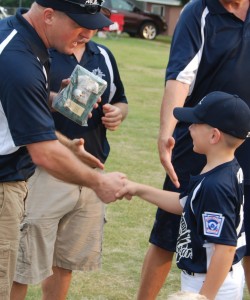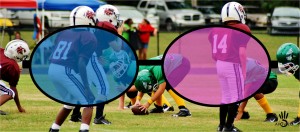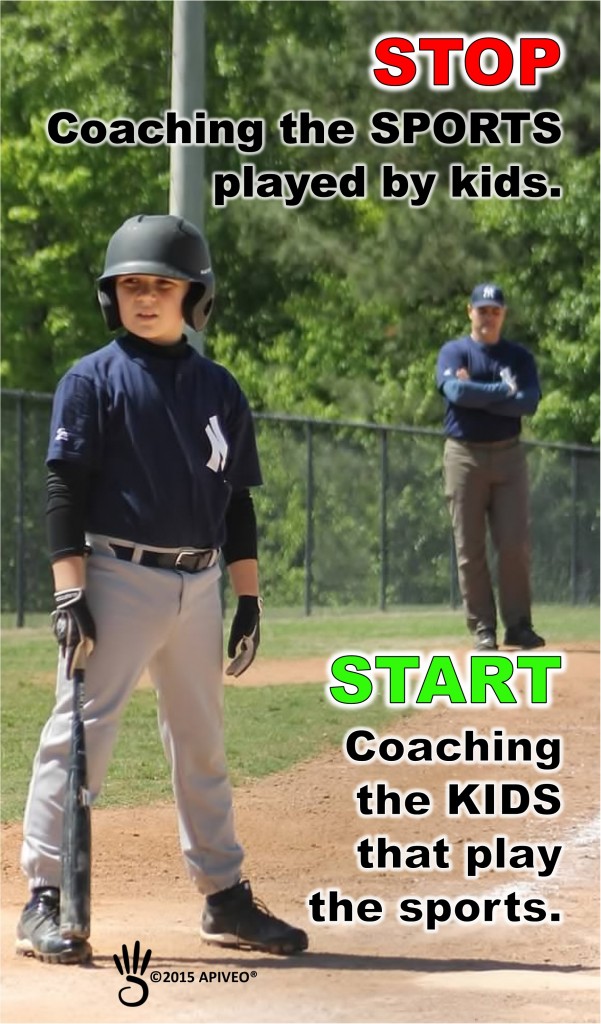 I would like to begin by saying that I am not in favor of “participation” trophies for youth athletes. The reason is not that we are giving out trophies to every player; instead, it’s the lack of creativity in what we call them and the meaning behind them. After coaching dozens of youth teams, I know that an eight- year-old player who came to practice, worked hard, played in the games and cheered on his/her teammates is not excited to be recognized as a “participant.” As parents and coaches, we have to be able to come up with something more meaningful than “participant.” [Read more…] about Sport Participation Trophies: A New Perspective
I would like to begin by saying that I am not in favor of “participation” trophies for youth athletes. The reason is not that we are giving out trophies to every player; instead, it’s the lack of creativity in what we call them and the meaning behind them. After coaching dozens of youth teams, I know that an eight- year-old player who came to practice, worked hard, played in the games and cheered on his/her teammates is not excited to be recognized as a “participant.” As parents and coaches, we have to be able to come up with something more meaningful than “participant.” [Read more…] about Sport Participation Trophies: A New Perspective
volunteer youth coach
Confessions of a Crybaby
(this blog was previously published on the TeamSnap blog)
I am a crybaby. Sometimes, I cry when I’m inspired or sad. Sometimes, I cry from disappointment or joy. I cried when my high school football team won the state championship. I even cried during an episode of Hannah Montana that I watched with my then 5-year-old daughter.
I’m sensitive, and a lot of things make me cry, especially the things I care deeply about. Tears are an expression of how I feel, and I don’t hold them back. In fact, I recently presented a leadership award to a 9-year-old athlete with tears in my eyes. I had to stop a few times during my speech to settle my voice. I am happy to report that during my speech, not one person attending shouted, “Suck it up, big boy. There’s no crying in award presentations!”
Why is it that that when kids cry during sports, they are labeled “crybabies”? When a kid cries, it seems to be some horrible indication of weakness. What I find most surprising is that the parents are usually the ones that get the most upset and embarrassed when their child cries.
We spend countless hours coaching and encouraging our kids to work hard and give it their all. Before games, we preach about having fun, making an effort and believing in yourself. It’s a fact of life that things don’t always go the way we plan. We will all experience the pain of failure. We won’t always make the tackle or record the strikeout. Throughout our lives, reality will often fall short of expectations regardless of preparation or how much we believe in ourselves.
Why cry? Because it hurts!
I have coached kids between 5 and 12 years old for many years. Each season I have been blessed with a few kids who work so hard and care so much that they cry when they fall short of what they expect of themselves. Here is a conversation I had with our pitcher after he hit two batters and allowed five runs in one inning. To set the stage, our pitcher came into the dugout in tears. His father immediately gave him a stern talking to and essentially, if not literally, told him to “suck it up.” I went over and sat next him on the bench.
Me: “Are you OK?”
Pitcher: (Sobbing loudly)
Me: “Are you tired of hearing that there is no crying in baseball?”
Pitcher: (Sobbing slowed)
Me: “What would you say if I told you that’s a lie? There IS crying in baseball. After all, there’s crying in life right? I cry sometimes myself and I’m a tough old man.”
Pitcher: (sobbing stopped and he looked directly into my eyes)
Me: “When you really care about something, and it doesn’t work out; it’s OK to cry. It shows how much you care. One of the things I like most about you is how much you care. Don’t ever stop caring that much about baseball and what you have to offer to your team. Are you OK?”
Pitcher: “Yes, sir.”
Me: “You can keep crying if you have to, but I need you to finish it up soon because we need you. The game is not over, and your team needs you.”
I’ve had similar conversations with kids from dozens of teams and in dozens of situations. After each conversation the child felt accepted and understood, which enabled him or her to accept, own and grow from his or her failure and frustration instead of hiding because of the fear of ridicule. Failures can be the signposts on our journey to success if we read them, understand them and take action. Pretending failures don’t matter and bottling up the emotions is not the way to build strong and emotionally balanced kids.
I am a crybaby because I care … just like the kids I get to coach.
Coach, STOP that and START this!
“I’m a volunteer youth coach, however, I don’t coach football, baseball, basketball, soccer or any other sport for that matter. I coach the kids that play them. This is not a play on words; it’s a paradigm shift in the way a youth coach views his or her opportunity and responsibility. STOP coaching the sports played by kids and START coaching the kids that play the sports.” –Brad Jubin, APIVEO
To Listen or Not To Listen?
It’s a matter of perspective
 We teach our kids to not listen to what others say about them yet nearly everything they do is graded or evaluated by someone. “If it’s not important then why is it important?” is an interesting paradox. Some of this confusion is eliminated when “you consider the source.” In other words, knowing if the person that made a statement is or is not qualified to make that statement. While this is often true it still doesn’t give a steadfast rule on who and what we should or should not listen too. Ironically, some of the most unlikely people will share some of the most profound insights at the most unexpected time.
We teach our kids to not listen to what others say about them yet nearly everything they do is graded or evaluated by someone. “If it’s not important then why is it important?” is an interesting paradox. Some of this confusion is eliminated when “you consider the source.” In other words, knowing if the person that made a statement is or is not qualified to make that statement. While this is often true it still doesn’t give a steadfast rule on who and what we should or should not listen too. Ironically, some of the most unlikely people will share some of the most profound insights at the most unexpected time.
Leadership is NOT a Team Sport
Leadership is an individual responsibility. Leadership is NOT a team sport. Each of us is called to lead in a specific and special way. That’s not to say a group of leaders cannot work together. To the contrary, leaders must cooperate. Leaders working in concert toward a common goal is extremely effective as long as each leader is personally responsibility for a specific area or function. In other words, they function as a team of leaders. There is a profound difference between a “leadership team” and a “team of leaders.”
 A leadership team (a.k.a. leadership by committee) can lead to confusion, contempt and even worse, compromise. I know it’s not politically correct to call compromise bad, but all too often, sound and decisive leadership decisions are watered down for the sake of compromise. Many “win-win” situations turn into to “lose-lose” outcomes because of this.
A leadership team (a.k.a. leadership by committee) can lead to confusion, contempt and even worse, compromise. I know it’s not politically correct to call compromise bad, but all too often, sound and decisive leadership decisions are watered down for the sake of compromise. Many “win-win” situations turn into to “lose-lose” outcomes because of this.
A great leader will solicit input and feedback. A great leader will consider as many points a view as possible before making a decision. However, when it’s time to chart a course, cast vision or call a play he or she will make a decision and execute.
For example, think about the last time you purchased a car or some other expensive item. You most likely did research online as well as visited dealerships or stores. You asked friends and colleagues. You spoke with people that already owned the brand or item you were considering. After all of that work, you made the decision. I doubt you went back to everyone you spoke with and asked them to vote to try to form a consensus as a basis for your purchase.
In today’s “leadership team” environment we have lost a great deal of accountability. Decisions can become so diluted by team involvement that no one knows who made the decision. “Including everyone’s opinion” has become the goal instead of an individual making a sound decision and being held accountable for the outcome.
It’s essential that leaders remain focused on the things they do best and stay in their lane. Imagine a 4×100 meter relay race between a “leadership team” and a “team of leaders.” Each leg of a relay race requires a certain type of athlete. Because of this, the “team of leaders” will assign each leg of the race to the leader that is best suited or equipped for that leg. On the other hand, the “leadership team” has a much broader view of the race and the level of participation. The “leadership team” seeks to involve everyone in every leg for maximum involvement. When the race begins both teams will move the baton around the track, however, the “team of leaders” will move as individuals in succession allowing for the greatest speed and efficiency. The “leadership team” will run the race side by side and hand the baton to each other in stride. The outcome of this race is obvious.
I have never read a single definition of leadership that describes more than one person. A leader is simply a person of influence that is influential in the area where he or she has demonstrated competence and achievement. Leadership is exclusively an individual responsibility.
Bridges Spencer : : APIVEO Player of the Month : : July 2014
Congratulations Bridges and thank you for Always Playing IV Each Other!
Watch Bridges’ inspiring story of leadership on CBS Atlanta.

Excerpt from the APIVEO Player of the Month award ceremony;
Each month we present the APIVEO Player of The Month award to a youth athlete from Metro Atlanta that has demonstrated leadership through service on their team, in their home or in their community.
This afternoon we celebrate Bridges Spencer because he Always Plays IV Each Other.
Bridges is a catcher and outfielder for Buckhead Baseball and I hear he has a cannon for an arm. But that’s not why he’s standing up here today. At the ripe old age of 12, Bridges has already served the Atlanta Police Athletic League for several years. He has been a camp counselor and a trusted friend; he has helped organize equipment drives and refereed basketball games. He has rolled up his sleeves and cared for the kids served by the Atlanta Police Athletic League. That’s leadership! That’s Always Playing IV Each Other! – Brad Jubin, APIVEO
